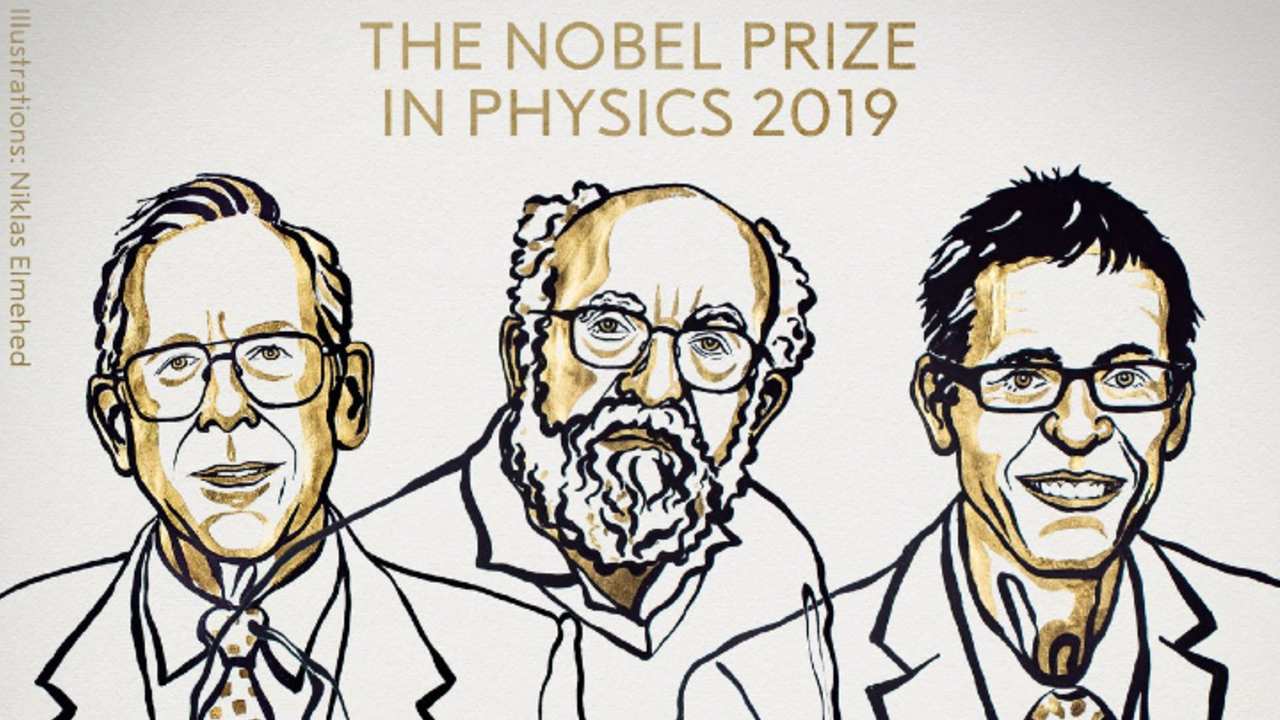tech2 News StaffOct 08, 2019 18:01:04 IST
Following the announcement of the Nobel Medicine Prize that was shared between three people including US researchers William Kaelin and Gregg Semenza, and Britain’s Peter Ratcliffe. Today, the Nobel Physics Prize was announced and awarded to three people – Canadian-American cosmologist James Peebles and two Swiss scientists Michel Mayor and Didier Queloz – for their work in understanding how the universe evolved since the Big Bang and the discovery of the first known planet outside our solar system.

Nobel Prize in Physics 2019 awarded to James Peebles, Michel Mayor, and Didier Queloz. Image: Twitter/NobelPrize.
Canadian-born James Peebles, 84, of Princeton University, was credited for “theoretical discoveries in physical cosmology” and Switzerland’s Michel Mayor, 77, and Didier Queloz, 53, each from the University of Geneva, were honored for discovering “an exoplanet orbiting a solar-type star,” said Prof. Goran Hansson, secretary-general of the Royal Swedish Academy of Sciences.
This year’s #NobelPrize in Physics rewards new understanding of the universe’s structure and history, and the first discovery of a planet orbiting a solar-type star outside our solar system. The discoveries have forever changed our conceptions of the world. pic.twitter.com/7RQmabi47z
— The Nobel Prize (@NobelPrize) October 8, 2019
Peebles, hailed as one of the most influential cosmologists of his time, will collect one half of the 9-million kronor ($918,000) cash award, and the Swiss men will share the other half.
The Nobel committee said Peebles’ theoretical framework about the cosmos — and its billions of galaxies and galaxy clusters — amounted to “the foundation of our modern understanding of the universe’s history, from the Big Bang to the present day.”
His work set the stage for a “transformation” of cosmology over the last half-century, using theoretical tools and calculations that helped interpret traces from the infancy of the universe, the committee said. Peebles is the Albert Einstein Professor of Science at Princeton.
“My advice to young people entering science: you should do it for the love of science … You should enter science because you are fascinated by it”
– newly awarded laureate James Peebles speaking at today’s press conference announcing his #NobelPrize in Physics. pic.twitter.com/JaSM10glQT
— The Nobel Prize (@NobelPrize) October 8, 2019
Mayor and Queloz were credited having “started a revolution in astronomy” notably with the discovery of exoplanet 51 Pegasi B, a gaseous ball comparable with Jupiter, in 1995 — a time when, as Mayor recalled — that “no one knew whether exoplanets existed or not.”
An exoplanet is a planet outside the solar system.
“Prestigious astronomers had been searching for them for years, in vain!” Mayor quipped.
Michel Mayor, awarded this year’s #NobelPrize in Physics, was born in 1942 in Lausanne, Switzerland.
He is a professor at the University of Geneva @UNIGEnews. pic.twitter.com/y7EhuUZs4r
— The Nobel Prize (@NobelPrize) October 8, 2019
More than 4,000 exoplanets have since been found in the Milky Way since then, and “Strange new worlds are still being discovered, with an incredible wealth of sizes, forms, and orbits,” the committee said.
The University of Geneva quoted Mayor and Queloz as saying it was “simply extraordinary” that they won the prize for “the most exciting” discovery of their careers.
2019 Physics Laureate Didier Queloz @DidierQueloz was born in 1966.
He is a professor at the University of Geneva @UNIGEnews and the University of Cambridge @cambridge_unihttps://t.co/2veh6D86hk#NobelPrize pic.twitter.com/N1ZvW2HBwF
— The Nobel Prize (@NobelPrize) October 8, 2019
The cash prize comes with a gold medal and a diploma that are received at an elegant ceremony in Stockholm on Dec. 10, the anniversary of the death of prize founder Alfred Nobel in 1896, together with five other Nobel winners. The sixth one, the peace prize, is handed out in Oslo, Norway on the same day.
You can watch the full livestream of the Nobel Physics Prize announcement below:

- Nobel Prize in Physics 2019 awarded to James Peebles, Michel Mayor, and Didier Queloz. Image: Twitter/NobelPrize.
” height=”500″ src=”https://www.youtube.com/embed/ISKY4T-38cI” frameborder=”0″ allow=”accelerometer; autoplay; encrypted-media; gyroscope; picture-in-picture” allowfullscreen>
With inputs from The Associated Press.
<!–
Find our entire collection of stories, in-depth analysis, live updates, videos & more on Chandrayaan 2 Moon Mission on our dedicated #Chandrayaan2TheMoon domain.
–>
Post a Comment